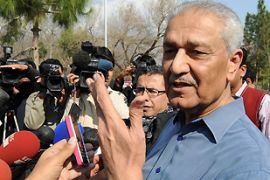Pakistan eases limits on scientist
Court upholds freedom of nuclear scientist accused of leaking atomic secrets.

“The court has disposed of the case and validated the decision of the Islamabad High Court on February 6, 2009,” Ahmar Bilal Sufi, a lawyer representing the government, said.
“Dr Khan will have to inform the authorities 30 minutes prior if he has to go out of his house in Islamabad and one day’s prior notice for going out of the city due to security reasons.
“Dr Khan, if he would like to, can interact with media, but he will not be able to speak on nuclear proliferation issues.”
House arrest
In 2004, Khan confessed on television to supplying nuclear weapons technology to North Korea, Libya and Iran, but he later retracted his remarks, saying he was pressured into doing so.
He went on to accuse Pervez Musharraf, the country’s former president, of nuclear proliferation.
Musharraf pardoned Khan in 2004, but he was kept under house arrest, guarded by troops and intelligence agents.
|
“Khan … can interact with media, but he will not be able to speak on nuclear proliferation issues” Ahmar Bilal Sufi, Pakistani government lawyer |
Al Jazeera’s Kamal Hyder, reporting from the capital, Islamabad, said the court ruling means that Khan is “relatively” more free now.
“He is an ailing man who spent almost six years under house arrest. So it will give him the freedom to at least move around,” he said.
“But will he have the freedom to talk? No. According to the court, the ruling was that he would not be allowed to speak on proliferation issues.”
Pervez Hoodbhoy, a professor of nuclear and high energy physics at the Quaid-e-Azam University in Islamabad, said the court decision to ease Khan’s restrictions was a result of pressure on the government.
“The military is very afraid of him because he is a loose cannon,” he told Al Jazeera.
“He likes self-publicity and he enjoys support in the country, therefore the military cannot easily touch him. So this decision to let him travel – albeit with some caveats – is something that happened as a result of two pressures.
“One on the part of the military, which wants him shut up. The other on the part of his admirers and friends in the judicial system who would like him to be acknowledged as a hero who made the bomb for Pakistan.”
Petition rejected
In a related ruling, the court rejected a government petition filed earlier this month to investigate Khan based on a report in the Washington Post newspaper.
The newspaper published excerpts of what it said was Khan’s official account of his country’s dealings with Iran, that describe the Islamic state’s attempted purchase of nuclear weapons in a $10bn deal.
The deals allegedly occurred with the knowledge of the Pakistani government – but Islamabad and Khan have denied the reports.
“The judge said it’s up the government,” Soofi Amar Bilal, a government lawyer, said of Monday’s ruling.
“If they want to do it, it’s an executive decision.”
Khan was at the centre of the world’s biggest nuclear proliferation scandal in 2004 when he confessed to selling nuclear secrets to Iran, North Korea and Libya.
Pakistan, which has not signed the nuclear Non-Proliferation Treaty, conducted several nuclear tests in 1998 but is thought to have the capability to produce bombs since 1986.